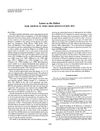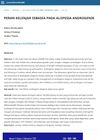 22 citations,
November 2008 in “International Journal of Dermatology”
22 citations,
November 2008 in “International Journal of Dermatology” A mix of 5-aminolevulinic acid and iron ion can speed up hair growth.
 February 2024 in “Current Medicinal Chemistry”
February 2024 in “Current Medicinal Chemistry” Minoxidil nanocrystals improved hair growth in mice more effectively and safely than regular Minoxidil.

Minoxidil nanoliposomes boost hair growth and reduce scalp bacteria better than regular minoxidil.
[object Object] Bitter melon leaves extract, especially at 10% concentration, promotes hair growth effectively.
 25 citations,
August 1992 in “In vitro cellular & developmental biology”
25 citations,
August 1992 in “In vitro cellular & developmental biology” The new system can grow hair in the lab and test hair growth treatments.
 72 citations,
October 2009 in “The FASEB journal”
72 citations,
October 2009 in “The FASEB journal” TRH stimulates human hair growth and extends the hair growth phase.
 22 citations,
June 2012 in “Journal of Investigative Dermatology”
22 citations,
June 2012 in “Journal of Investigative Dermatology” Adiponectin may stimulate hair growth and could be a potential treatment for promoting hair growth.
 August 2024 in “Bioimpacts”
August 2024 in “Bioimpacts” Kopexil is an effective and safe hair growth treatment.
 277 citations,
June 2003 in “The journal of investigative dermatology. Symposium proceedings/The Journal of investigative dermatology symposium proceedings”
277 citations,
June 2003 in “The journal of investigative dermatology. Symposium proceedings/The Journal of investigative dermatology symposium proceedings” Epithelial-mesenchymal interactions control hair growth cycles through specific molecular signals.
April 2022 in “DOAJ (DOAJ: Directory of Open Access Journals)” Effective hair regrowth after COVID-19 involves psychological support, good nutrition, and hair growth treatments.
 February 2013 in “Jurnal Biomedik : JBM”
February 2013 in “Jurnal Biomedik : JBM” The sebaceous gland plays a significant role in hair loss and thinning, and using growth stimulators, DHT inhibitors, anti-inflammatory drugs, anti-androgens, and super oxide dismuse substances can help manage it.
 155 citations,
August 2003 in “Journal Of Experimental Zoology Part B: Molecular And Developmental Evolution”
155 citations,
August 2003 in “Journal Of Experimental Zoology Part B: Molecular And Developmental Evolution” Understanding hair growth involves complex interactions between molecules and could help treat hair disorders.
5 citations,
January 2018 in “Italian journal of dermatology and venereology” Minoxidil effectively stimulates hair growth in androgenetic alopecia.
[object Object]  4 citations,
May 2018 in “Electronic Journal of Biotechnology”
4 citations,
May 2018 in “Electronic Journal of Biotechnology” All-trans retinoic acid at high doses harms goat hair growth cells and could be bad for hair growth.
 3 citations,
April 2022 in “Clinical, Cosmetic and Investigational Dermatology”
3 citations,
April 2022 in “Clinical, Cosmetic and Investigational Dermatology” Different methods, including stress management, healthy diet, supplements, and treatments like minoxidil, can help hair grow back after COVID-19 related hair loss.
 55 citations,
January 2002 in “Journal of liposome research”
55 citations,
January 2002 in “Journal of liposome research” New liposomal formulations may improve delivery of treatments to hair follicles, potentially helping with hair loss.
 July 2018 in “Elsevier eBooks”
July 2018 in “Elsevier eBooks” Stopping tight hairstyles can prevent and reduce traction alopecia.
 30 citations,
September 2003 in “Experimental Dermatology”
30 citations,
September 2003 in “Experimental Dermatology” Minoxidil helps prevent stress-caused hair loss in mice.
 108 citations,
November 2006 in “Phytomedicine”
108 citations,
November 2006 in “Phytomedicine” Green tea component EGCG could potentially promote human hair growth.
 15 citations,
May 2020 in “BMC complementary medicine and therapies”
15 citations,
May 2020 in “BMC complementary medicine and therapies” Polygonum multiflorum extract helps hair grow longer and fights the effects of hormones that cause hair loss.
 3 citations,
June 1997 in “Veterinary Dermatology”
3 citations,
June 1997 in “Veterinary Dermatology” Minoxidil treatment can stimulate hair growth in hairless puppies if applied early.
 211 citations,
October 2001 in “The FASEB Journal”
211 citations,
October 2001 in “The FASEB Journal” Noggin is necessary to start the hair growth phase in skin after birth.
 120 citations,
November 2014 in “Biological Reviews”
120 citations,
November 2014 in “Biological Reviews” The telogen phase of hair growth is active and important for preparing hair follicles for regeneration, not just a resting stage.
 90 citations,
October 1996 in “Dermatologic Clinics”
90 citations,
October 1996 in “Dermatologic Clinics” Growth factors are crucial for hair development and could help treat hair diseases.
 69 citations,
December 2011 in “Journal of Ethnopharmacology”
69 citations,
December 2011 in “Journal of Ethnopharmacology” Some Thai plants, especially Carthamus tinctorius, could help prevent hair loss and promote hair growth without adverse effects.
 54 citations,
January 2013 in “BMC Complementary and Alternative Medicine”
54 citations,
January 2013 in “BMC Complementary and Alternative Medicine” Thuja orientalis hot water extract may help hair grow by starting the growth phase and improving hair follicle development.
 30 citations,
September 2004 in “Experimental Dermatology”
30 citations,
September 2004 in “Experimental Dermatology” Scalp hair follicle culture has limits for testing minoxidil's hair growth effects.
 28 citations,
October 2011 in “International Journal of Molecular Medicine”
28 citations,
October 2011 in “International Journal of Molecular Medicine” Adenosine helps hair grow longer and stronger by boosting certain growth factors and signaling pathways.
 26 citations,
October 2007 in “Experimental Dermatology”
26 citations,
October 2007 in “Experimental Dermatology” L-Carnitine-L-tartrate may help hair grow and prevent hair loss.
 20 citations,
August 2015 in “International Journal of Molecular Medicine”
20 citations,
August 2015 in “International Journal of Molecular Medicine” Human placental extract may help hair growth by affecting certain cell signals and could be more effective with minoxidil.



























